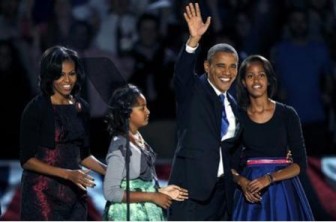WASHINGTON, (Reuters) – Growing optimism about the economy and a big turnout of the core Democratic coalition sealed President Barack Obama’s re-election victory.
After years of bleak economic news, enough Americans now believe better days lie ahead for the U.S. economy. The coalition of young, female and minority voters that propelled Obama to victory four years ago also turned out again, in huge numbers.

REUTERS/Jeff Haynes
Early exit polls reflected a pro-Obama turnout by minorities and single women so big that in some key states it exceeded numbers seen during his historic election in 2008 as America’s first black president.
Although Republican Mitt Romney did much better with independent voters than Obama on Tuesday, that advantage was wiped out in key battleground states by an enthusiasm Obama managed to engender among his core coalition that many analysts were writing off just a few months ago as dispirited and fractured.
In Pennsylvania, for example, African-American turnout exceeded 2008 levels, ABC News said. In Nevada, 18 percent of the voters were Latino – up from 15 percent in 2008, according to CNN.
That rapidly growing electoral bloc backed Obama overwhelmingly, as it appeared to be doing in Florida, one of the biggest prizes with its 29 electoral college votes. By Tuesday night, Florida – a state Romney had been confident of winning – was too close to call, but appeared to be heading toward an Obama victory.
Obama also opened up a large gender gap over Romney among women, several exit polls indicated.
“I thought four years ago there was an enduring Obama electorate, and that is what we’ve seen tonight,” said Tad Devine, a veteran Democratic strategist.
“It’s made up of African-Americans, Latinos, single women and young people,” he said. “You combine that with blue-collar union workers and upper-educated whites, and you have a majority, especially in battleground states.”
Devine added: “This coalition has legs. It reflects the demographic reality of America – the country is becoming less white, and there are more minorities and single people.”
MANY VOTERS STILL BLAME BUSH
Romney also appeared to have overplayed his hand when it came to his central campaign argument that the U.S. economy was in dire straights because of Obama’s bungled fiscal stewardship.
In politically divided states such as Virginia, Iowa and Ohio, Romney had an edge among voters who believed he would do a better job handling the economy – but only just. It was not enough for a candidate who made the economy central to his campaign.
As the night wore on, Romney’s path to victory narrowed and was all but gone by 10 p.m. EST (0300 GMT Wednesday). State after battleground state he needed to win to get to the 270 electoral votes needed for victory fell to Obama: New Hampshire, Iowa, Colorado, Nevada, Wisconsin and Pennsylvania. By 11 p.m. EST, Obama had narrowly carried Ohio – and with it re-election.
Obama effectively swept the American Midwest, the county’s industrial heartland.
Romney’s efforts to convince voters that America’s stubbornly high unemployment rate of 7.9 percent was all Obama’s fault appeared to have backfired.
Early national exit polls revealed that about 50 percent of U.S. voters still blamed former Republican President George W. Bush for the country’s economic problems rather than Obama.
Bill Galston, a former domestic policy adviser to Democratic President Bill Clinton, said Obama clinched victory because a range of economic factors improved in the past six months.
Galston said the jobless rate had been ticking downward, the housing market appeared to have stabilized with home prices finally rising, and consumer confidence had been improving.
A Reuters/Ipsos poll conducted in the week before the election reflected how voters’ views of the economy had been improving steadily.
In October 2011, several months into Romney’s candidacy, only one quarter of the country believed America was heading in the “right direction” – a key metric looked at by pollsters and a grave worry then for Obama’s strategists.
By last week, that number had risen to 45 percent.
“The president’s handling of the economy had to be the centerpiece of Romney’s campaign,” Galston said. “He had no choice. But all sorts of economic signs perked up in the past six months – and just in time for the president.”
Yet Obama’s victory in the face of such a high unemployment rate was remarkable given the historical winds he faced. No U.S. president has won re-election with an unemployment rate of over 7.2 percent since Franklin Roosevelt in 1936.
No Republican has ever won the White House without victory in Ohio and the critical swing state was carried by Obama in large part because of his decision early in his presidency to bail out the bankrupt auto industry in neighboring Michigan.
In Ohio, where one in 8 jobs is tied to the auto industry, an overwhelming 59 percent of voters approved of the bailout – a move opposed by Romney at the time. Of that 59 percent, three quarters backed Obama in Ohio on Tuesday.
In Ohio, according to exit polls conducted by CNN, 37 percent of voters believed the economy was getting better, compared with 33 percent who thought things were getting worse.
In Virginia, 43 percent saw things improving, compared with 36 percent who believed life was going to get worse.
In those battleground states, and in others such as Colorado and Iowa, Obama enjoyed significant leads with voters on the question of who would best fight for the middle class and “people like us.”
David Gergen, a political analyst and former adviser to two Democratic and two Republican presidents, said: “There is no doubt the president benefited from his economic policies. His auto bailout may have won Ohio and helped win key votes in the upper Midwest.”
Gergen added: “Consumer confidence is also on the rise, inspired in part by cheery White House whisperings that success is just around the corner. Voters may have a rude disappointment, but they bought in during this election season.”

